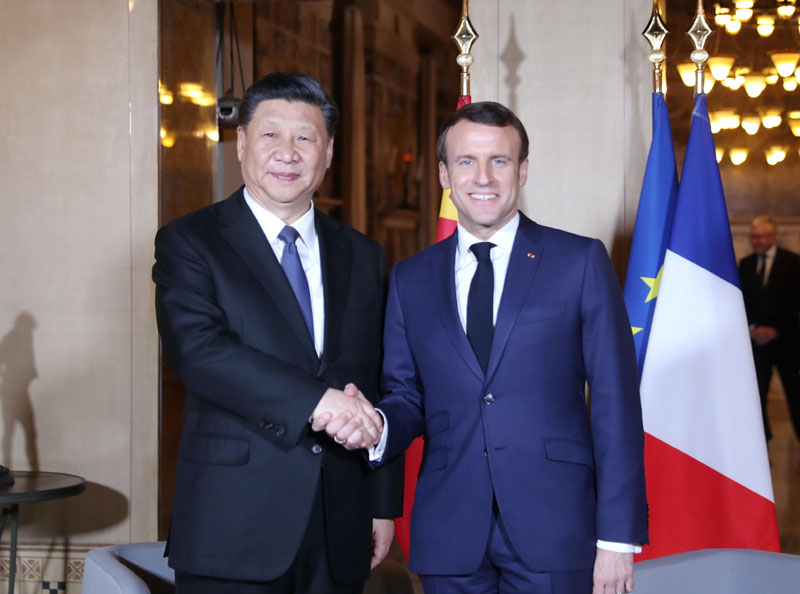Belt and Road
Your Present Location: PROGRAMS> Belt and RoadGermany willing to actively participate in the 2nd BRI forum
Source: Global Times Published: 2019-3-27
Chinese President Xi Jinping held "unprecedented" talks on building new global governance with French President Emmanuel Macron, German Chancellor Angela Merkel and EU Commission President Jean-Claude Juncker on Tuesday in Paris.
After meeting with the three European leaders, Xi also had a one-on-one meeting with Merkel, and Xi said that China-Germany relations continue to be stable despite increasing uncertainty and instability in current international affairs, the Xinhua News Agency reported.
Xi said China and Germany are not competitors, and not rivals at all, and seeking a win-win outcome through cooperation is the core of China-Germany ties.
Germany seeks to deepen economic and trade relations with China in the digital age and is willing to actively participate in the second Belt and Road Forum for International Cooperation in Beijing in April, Xinhua quoted German Chancellor as saying.
Macron said at the meeting with three leaders of China, Germany and the EU that competition between the EU and China must not lead to a breakdown in world trade systems or political isolationism, as Xi said China will work side-by-side with Europe, Reuters reported on Tuesday.
The French president also said he wanted to build a fairer, more balanced multilateral trade framework with China. "We must show through actions that cooperation brings more than confrontation and that we have more to win through openness than by closing doors," Macron said.
The French leader has sought to forge a united European front to confront Chinese advances in trade and technology and foster a more balanced relationship with Beijing, Reuters reported, and called on Tuesday for a partnership with China built on trust. "We expect our partners to respect the unity of the EU."
Wang Yiwei, Jean Monnet Chair Professor at the Renmin University of China, told the Global Times on Tuesday that "China-related issues make EU members come up with a united stance on industrial policies."
In fact, diversity is part of the EU's nature from the very beginning, so when the EU and its core members realize its unity is being challenged, they shouldn't blame others, because their partners are not the fundamental reason for the EU's diversity, Wang noted.
Xi said at a press conference after the meeting that cooperation was the main trend in China-European relations, even if the two sides have their differences and competition exists, Reuters reported.
"Cooperation is greater than competition. We should increase the positive energy," Xi said. "We are working side by side and helping each other, and we shouldn't be always worried about watching our back while moving forward."
Macron's tweets after the meeting showed that China, France, Germany and the EU's leaders discussed the Iranian nuclear deal, climate change, balancing economic ties and multilateralism.

More trade reciprocity
Merkel said Europe wants to play an active role in the China-proposed Belt and Road Initiative (BRI), but that it must lead to more trade reciprocity.
The EU wants China to create a level playing field in the BRI for Chinese and European companies, said Bruno Macaes, a former Europe minister from Portugal. The EU would like its companies to be able to compete on equal terms with Chinese companies for Belt and Road projects and thinks this can only be done with transparent rules and bidding processes, Macaes said.
Juncker also said Europe wants to deepen it partnership with China, based on reciprocity, and is committed to fair and effective multilateralism. "China and Europe must and can do great things together. We are strategic partners and, yes, rivals - it is complimentary."
Cui Hongjian, director of EU Studies at the China Institute of International Studies, told the Global Times on Tuesday that the EU has started to call China a rival because it has started to pay serious attention to China. "This is a consequence of the shift in the power balance between China and the EU."
Macaes said that EU-China relations are becoming more difficult, but there is no sign EU leaders want to decouple from China. That is the difference between the EU and the US. "The EU will become a tougher negotiator and seek more concessions from China--in exchange for Huawei access to Europe, for example."
China vows to further open up its market for a more balanced trade with Europe, including accelerating bilateral investment negotiations, which is forecast to be inked by the end of 2020, Wang noted.
"China and the EU will also continue being engaged in WTO reforms, with more contributions from the Chinese side, including the services trade and digital business," Wang told the Global Times.
Wang Yiwei is a senior fellow of Chongyang Institute for Financial Studies at Renmin University of China. Bruno Macaes a Non-Resident Senior fellow of Chongyang Institute for Financial Studies, Renmin University of China.























































































 京公网安备 11010802037854号
京公网安备 11010802037854号





